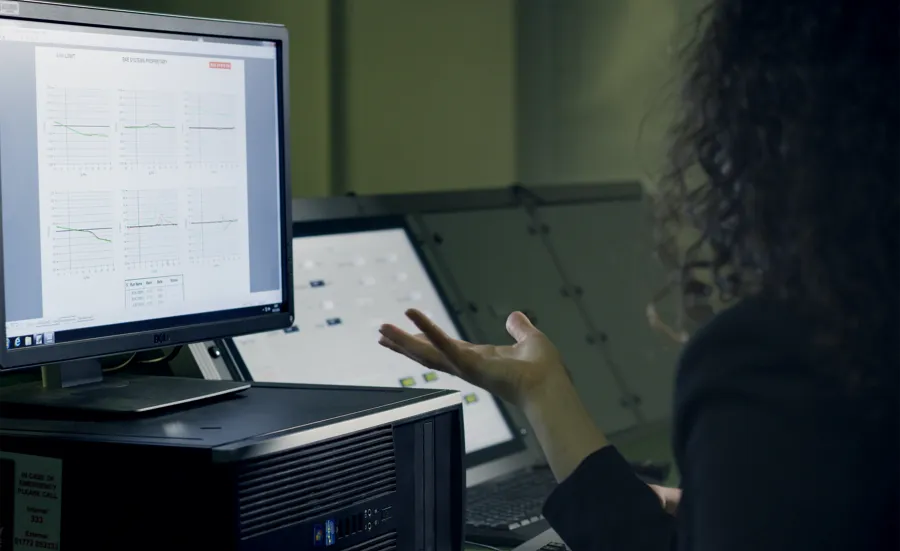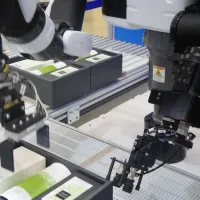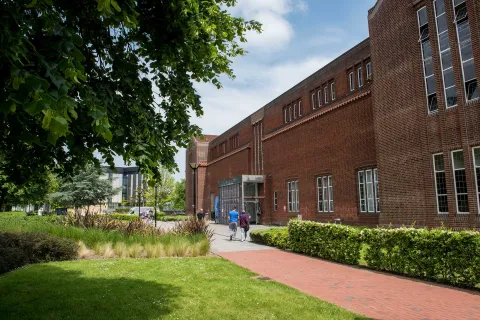Mathematical sciences

Join our vibrant and supportive community of academics and postgraduates with expertise in operational research, statistics, pure and applied mathematics and theoretical physics.

Join our vibrant and supportive community of academics and postgraduates with expertise in operational research, statistics, pure and applied mathematics and theoretical physics.

In the 2021 Research Excellence Framework (REF 2021), 100% of our research impact and research environment was specifically rated as internationally excellent or of world-leading quality. We are ranked 17th in the Sunday Times Good University Guide 2021 and 12th for Mathematical sciences in the Russell Group.
You'll be supported by supervisors who are international experts in their field, spanning pure and applied mathematics, statistics and operational research. They'll provide guidance and also direct you to further in-depth training.
We offer a wide range of training opportunities. You'll have access to specialised in-house post-graduate courses and three National Postgraduate Training Networks in Applied and Pure Mathematics (MAGIC), Operational Research (NATCOR) and Statistics (APTS).
You’ll be encouraged to participate in research seminars and discussion and attend conferences. You'll have a personal computer, a desk in a shared office and a conference attendance allowance.
Our academics have direct contact with potential employers. Our postgraduate students are highly sought after by other universities, business and industry, NGOs and governments worldwide.
We offer 2 PhD routes.
This is a research degree of up to 4 years duration. When you apply, you'll choose one of the following specialisms:
Our iPhD is a doctoral programme in mathematical sciences, which includes a taught first year. The duration of the programme is up to 5 years.
We have one of the broadest communities of mathematicians in the UK. We collaborate not only with other mathematicians, but also with engineers, scientists, biologists and social scientists.
You can either apply for a structured studentship or propose your own PhD idea.
Taking a structured studentship will give you access to additional training, conferences and secondments.
As a research project within the Doctoral Centre for Advanced Electrical Power Engineering this project will investigate the impact of heterogeneous burial environments on the power flow capacity of high voltage submarine cables.
This research project will explore how Artificial Intelligence (AI) can be strategically integrated into maritime operations to enhance decision-making, improve operational efficiency, reduce environmental impact, and mitigate risks associated with navigation, logistics, and sustainability.
We offer a wide range of fully funded research projects.
These projects:
We also offer studentships in all our current research areas.
Visit our research groups and project pages to contact members of staff listed in your area of interest to enquire about possible PhD projects.
Doctoral training centres offer fully funded studentships which include:
We administer the Engineering and Physical Sciences Research Council (EPSRC) DTP funding for research projects in mathematical sciences. Funding decisions are handled directly by the centre. The decision to award funds is independent of, and separate from, the decision on to offer you a place on a PhD degree.
Find out more about EPSRC DTP funding.
We offer scholarships and teaching bursaries ourselves. Your potential supervisor can guide you on what is available.
If you’re an international student you may be able to apply for a scholarship from your country.
Find out more about scholarships
Once you've found a supervisor, they can help you with potential funding sources. We offer match funding in some cases.
You'll need to state how you intend to pay for your tuition fees when you submit your application.
Find out more about funding your PhD
You may be able to fund your postgraduate research with funding from your current employer or from industry.
You can borrow up to £29,390 for a PhD starting on or after 1 August 2024. Doctoral loans are not means tested and you can decide how much you want to borrow.
Find out about PhD loans on GOV.UK
You may be able to win funding from one or more charities to help fund your PhD.
We charge tuition fees for every year of study. If you're applying for a fully funded project, your fees will be paid for you.
2023 to 2024 entry:
| Subject | UK fees | International fees |
|---|---|---|
| Mathematical sciences full time | tbc | £18,600 |
| Mathematical sciences part time | tbc | £9,300 |
2024 to 2025 entry:
| Subject | UK fees | International fees |
|---|---|---|
| Mathematical sciences full time | £4,786 | £19,200 |
| Mathematical sciences part time | £2,393 | £9,600 |
2025 to 2026 entry:
| Subject | UK fees | International fees |
|---|---|---|
| Mathematical sciences full time | tbc | £19,620 |
| Mathematical sciences part time | tbc | £9,810 |
You're eligible for a 10% alumni discount on a self-funded PhD if you're a current student or graduate from the University of Southampton.
Mathematical sciences hosts a number of specialist research and teaching centres. In some cases we collaborate with other areas, such as business and social and political science.





We offer several research programmes including a general mathematical sciences iPhD:
Decide whether to apply to an advertised research project or create your own proposal.
It's a good idea to email potential supervisors working within your field of interest to discuss potential PhD projects. It's best to do this well ahead of the application deadline.
You’ll find supervisors’ contact details listed with the advertised project, or you can search for supervisors in the staff directory.
The application process is the same whether you're applying for a funded project, or have created a research proposal.



For both the PhD and the iPhD you should have a 2:1 honours undergraduate degree or equivalent qualification.
If you have completed a master’s degree, you should have achieved a merit or above including 60%, for the dissertation.
You will also need a satisfactory performance at interview.
If English is not your first language, you'll need an IELTS minimum level of 6.5 with a 6.0 in writing, reading, speaking and listening.
Your awarded certificate needs to be dated within the last 2 years.
If you need further English language tuition before starting your degree, you can apply for one of our pre-sessional English language courses.
Check the specific entry requirements listed on the project you’re interested in before you apply.
Research degrees have a minimum and maximum duration, known as the candidature. Your candidature ends when you submit your thesis.
Most candidatures are longer than the minimum period.
| Degree type | Duration (full time) | Duration (part time) |
| Mathematical sciences PhD | 2 to 4 years | 4 to 7 years |
| Mathematical sciences iPhD | 4 to 5 years | Up to 8 years |